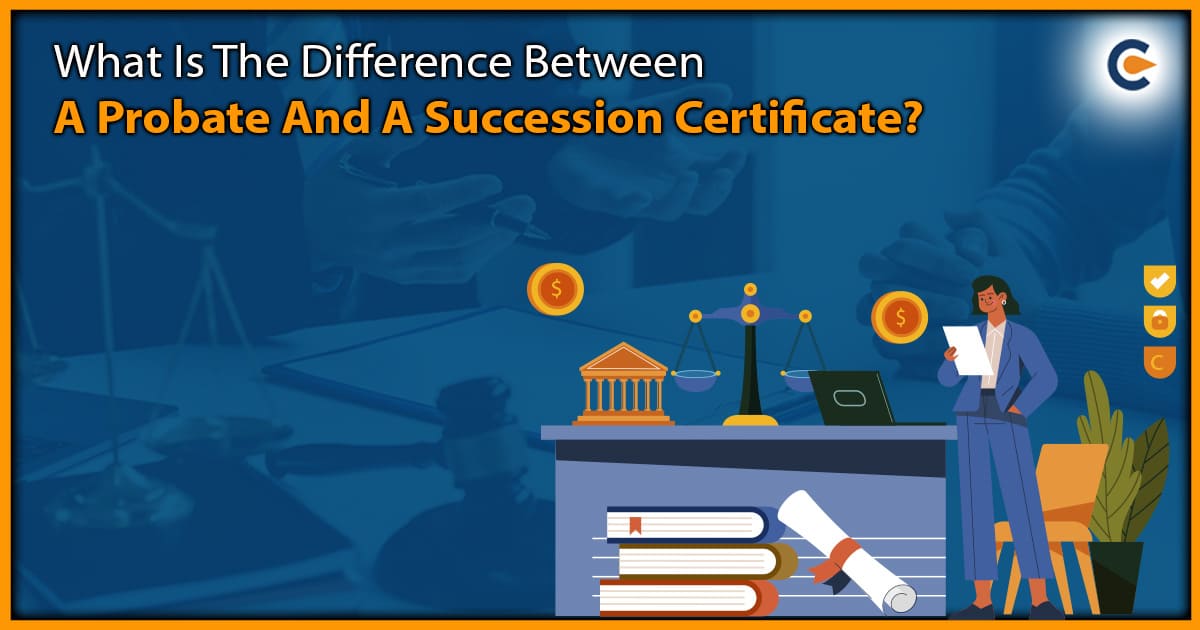While both a probate and a succession certificate have the same purpose of distributing the deceased’s property while following out the deceased’s desires, their methods and outcomes differ. Obtaining a succession certificate is typically the first and simplest step, but obtaining a probate requires a lengthy procedure that may or may not be necessary in most cases. Explain the distinction between probate and succession certificates:
Probate
According to Section 2(f)1 of the Indian Succession Act of 1925[1], probate is a copy of the will that has had the appropriate court’s seal affixed to it. The applicant (who is an executor under the will) is given powers relative to the administration of an estate via probate. It is a legal procedure through which a will’s authenticity and validity are decided in a court of law. The will’s executor, beneficiaries, and estate valuation are all decided throughout this procedure. The process of probate enables the executor to get a court declaration confirming his legal capacity to manage the testator’s estate in accordance with the terms of the will. A beneficiary may even be named as an executor in a will.
If the decedent left a will, it will specify who they wanted to handle their estate’s administration. The title “executor of the will” refers to this individual.
- The legal procedure of administering a decedent’s estate, settling all claims, and distributing the decedent’s property in accordance with a will is known as “granting probate.”
- A petition for probate may be filed in accordance with Section 276 by submitting an application with a copy of the testator’s will attached, stating the date and time of the testator’s.
- Death, that the petitioner is an executor named in the will, that the testator’s last will and testament was duly executed, the amount of assets likely to pass into the petitioner’s hands, and that the deceased was a resident or owned property within the court’s jurisdiction.
- The petitioner must pursue an extra verification method as specified in Sections 279, 280, and 281.
- Section 282 provides for a penalty for false averments in the petition and verification, with the person making the averments and verification knowing and believing them to be false and committing an offence under Section 193 of the Indian Penal Code.
- According to Section 281 of the Act, a petition for probate must receive confirmation from at least one of the will’s witnesses.
- A petition for probate may become a contentious matter in some cases if it is opposed by someone, the will is contested, and there is a disagreement about whether the petition should be granted.
- According to Section 295 process for disputed matters, these proceedings will be subject to the Code of Civil Process of 1908 ordinary suit rules. The individual who requests probate is the plaintiff in such a contentious action, and the one who objects to the grant is the defendant.
- When the court determines that a will’s probate can be granted based on the facts and circumstances, the petition, the will, the evidence presented, and in contentious proceedings after hearing the parties, the court shall grant a probate under its seal in the form specified in Schedule VI of the Indian Succession Act.
Authority to Issue a Certificate
Before the Principal Court of Original Jurisdiction or the High Court (which has concurrent jurisdiction)
Who Is In Charge Of Getting It Issued?
Administrator or Executor of a Will
Consequence
An executor takes the place of the deceased in managing and distributing property to heirs.
Impact of Further
The grant of a succession certificate is superseded by a later probate.
Representative Proof
Probate is the legal evidence of a representative title.
Easy To Get
Little more challenging than the legal heir certificate procedure since a petition and court fee must be submitted before a suitable court.
A Document Is Necessary For Probate
- A document is necessary for probate.
- Authentic will of the deceased.
- “Death certificate.”
- The title deeds for the real estate specified in the will
- Fee
- The records for the moving property are indicated in the will.
It Consists Of the Following Steps
- Identifying the dead person’s possessions
- listing the deceased’s belongings.
- Establishing in court the validity of a deceased person’s will.
- How to divide residual property in accordance with the will
- Organising and distributing their money, jewellery, and valuables as inheritance after paying any taxes and obligations.
Who Cannot Be Given Probate
A minor or a person who lacks capacity for decision-making cannot be given probate, according to Section 223 of the Indian Succession Act, 1925. An organisation of persons cannot receive it unless it is a corporation that complies with the requirements set forth in the rules that will be published by publication in the Official Gazette by the State Government in this regard.
Succession Certificate
When a person dies without leaving a will or any other testamentary instrument, the Succession Certificate comes into play to deal with the deceased’s moveable estate, such as FDRs, bank accounts, demat accounts, PPF, and so on. The court might issue a succession certificate in order to collect the deceased’s debts.
When a person visits financial organisations such as banks and firms to obtain control of the deceased’s inherited debts and securities, he or she must establish that he or she is the lawful heir of the deceased. The Hindu Succession Act 1956 governs succession, and the method outlined in the Indian Succession Act 1925 is followed.
Many individuals believe that once a succession certificate is received, the person automatically owns the decedent’s assets; however, this is untrue. A succession certificate enables the individual to behave just as a nominee would. It grants the bearer permission to distribute the estate’s assets.
In general, a legal heir requests a succession certificate for the deceased person’s moveable property, which is mostly debts and securities, in the absence of a will. Part X of the Indian Succession Act of 1925 contains provisions pertaining to succession certificates. A succession certificate can only be given to the legal heirs of a person who passes away intestate, unlike a probate or letters of administration with the will annexed, which are granted when a will exists or when someone requests administration of the estate or property belonging to someone who has passed away leaving behind a will (testamentary succession) and not intestate.
A succession certificate is a legal document that attests to someone’s status as the dead person’s successor. Although the issuance of a succession certificate does not exclusively confer right, title, and interest to the applicant in the decedent’s property or establish the decedent’s right, title, and interest over any property, it does permit the holder of the certificate to act as the decedent’s successor in realising debts and securities.
The applicant successor, however, is only granted access to the decedent’s property for the purpose of managing and administering it in line with the law under the terms of the certificate.
- A restriction on the provision of certificates under this part is imposed by Section 370 of the Act, which allows for the issuance of succession certificates. The following three limitations apply to the issue of succession certificates:
- Requirement that the asset for which the certificate is requested must be a debt or security.
- It cannot be in relation to any debt or security for which a right must be established by letters of administration to a person of the Hindu, Muslim, Buddhist, Sikh, Jain, or Parsi faith in order for a right to be recognised under Section 212.
- It cannot be a debt or security for which a right to be created by probate is needed under Section 213 of the Code.
- According to Section 371 of the Act, “the District Judge within whose jurisdiction the deceased ordinarily resided at the time of his death, or if he had no fixed place of residence at that time, the District Judge within whose jurisdiction any part of the deceased’s property may be found, may grant a certificate under this part.” The following are some key points from Section 371:
- Application: A District Judge will hear the application for a succession certificate.
- The deceased’s residence and the district judge’s jurisdiction: The application shall be heard by the district judge(s) whose district the deceased was habitually resident in at the time of his death.
- No established place of residence: If the deceased had no fixed abode when he passed away, an application will be made to the district judge in whose area any of the deceased’s property may be located.
- According to Section 372 (2), the petitioner is considered to have committed a crime under Section 198 of the Indian Penal Code if any of the petition’s allegations are ones that they made and confirmed while knowing and believing them to be untrue.
- Furthermore, Section 373 stipulates a process that courts of law must adhere to. The court will set the date for the hearing, require notice of the application to be served, place it in a prominent location on the court grounds, and publish it before making a swift decision about the applicant’s access to the certificate.
- Section 374 of the Act mandates that the contents of the certificate must be specified after the court has reached its decision and has decided to issue a certificate.
- The person to whom the certificate is granted is thereby empowered to receive interest or dividends, or to negotiate or transfer, or both to receive interest or dividends on and to negotiate or transfer the securities, or any of them. The court shall specify the debts and securities as set forth in the application for the succession certificate when granting a certificate.
- The succession certificate may also be extended by the court to any additional debt or securities that weren’t initially included in the application. The Indian Succession Act’s Schedule VIII specifies the format in which the succession certificate or extended certificate must be provided.
- According to Section 381 of the act, the effect of a succession certificate is that it provides full indemnity to all parties involved and is conclusive as against the people who are owing the debts or who are liable for the securities specified in the certificate.
- When read with Section 388, Section 384’s appeal provision for court orders under this part states that a district judge’s order may be appealed to the High Court, and if the district judge’s authority is delegated to inferior courts, an appeal may also be made to the district judge directly from the orders of those inferior courts.
Authority to Issue a Certificate
The District Judge within whose jurisdiction the deceased habitually resided at the time of his death, or if he had no regular place of residence at the time of his death, the District Judge within whose jurisdiction any part of the deceased’s property may be discovered, may give a certificate.
Who Is In Charge Of Getting It Issued?
Legal Heirs
Consequence
The individual who receives the certificate may earn interest or dividends on the property, as well as negotiate or transfer it.
Representative Proof
A succession certificate is a confirmation of the legal representative’s title.
Easy To Get
A petition must be submitted before a competent court, along with a court fee, making this process slightly more complex.
It Contains the Following Information
- The deceased’s property details
- The deceased’s entire address at the time of death
- The dead person’s family or other close relatives, along with their addresses
- The debts and securities to which the certificate applies
- The petitioner’s rights
A Document Is Necessary For the Succession Certificate
- Information on the securities and debts to which the certificate is applied
- Court costs.
- Family members names
- A family member’s certificate of no objections.
- The records for the moving property are indicated in the will.
Conclusion
Probate and succession certificates are legal documents that confer rights on a deceased person’s estate. Probate is the principal document used to validate administrative rights connected to the deceased’s estate. In comparison, the purpose of the succession certificate is quite restricted. Although a succession certificate can be used to acquire debts and securities, rights to immovable property and assets of considerable value require the approval of probate.
Read Our Article: Probate, Succession Certificate, & Legal Heir Certificate: Scope & Applicability











